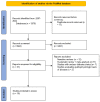How Do the Different Types of Maternal Diabetes during Pregnancy Influence Offspring Outcomes?
- PMID: 36145247
- PMCID: PMC9500644
- DOI: 10.3390/nu14183870
How Do the Different Types of Maternal Diabetes during Pregnancy Influence Offspring Outcomes?
Abstract
Background/Aim of the study: Exposure to maternal diabetes is considered one of the most common in utero insults that can result in an increased risk of complications later in life with a permanent effect on offspring health. In this study, we aim to assess the level of risk associated with each type of maternal diabetes on obesity, glucose intolerance, cardiovascular diseases (CVD), and neurodevelopmental disorders in offspring. Methods: We conducted a systematic review of the literature utilizing PubMed for studies published between January 2007 and March 2022. Our search included human cohorts and case control studies following offspring exposed at least to two different types of maternal diabetes clearly identified during pregnancy. Collected outcomes included prevalence, incidence, odds ratio, hazard ratio and risk ratio. Results: Among 3579 published studies, 19 cohorts were eligible for inclusion in our review. The risks for overweight, obesity, type 2 diabetes (T2D), glucose intolerance, metabolic syndrome, and CVD were increased for all types of maternal diabetes during pregnancy. The risk of overweight or obesity in infancy and in young adults was similar between gestational diabetes mellitus (GDM) and type 1 diabetes (T1D). The risk for T2D or abnormal glucose tolerance was double for offspring from GDM mothers compared to offspring from T1D mothers. In contrast, the risk for T1D in offspring at any age until young adulthood was increased when mothers had T1D compared to GDM and T2D. The risk for CVD was similar for all types of maternal diabetes, but more significant results were seen in the occurrence of heart failure and hypertension among offspring from T2D mothers. The risk of autism spectrum disorders and attention deficit/hyperactivity disorders was mainly increased after in utero exposure to preexisting T1D, followed by T2D. Conclusions: Offspring of diabetic mothers are at increased risk for multiple adverse outcomes with the highest risk detected among offspring from T2D mothers. Future work warrants large multiethnic prospective cohort studies that aim to identify the risks associated with each type of maternal diabetes separately.
Keywords: attention deficit hyperactive disorder; autism; cardiovascular diseases; gestational diabetes mellitus; metabolic syndrome; neurodevelopmental disorders; obesity; overweight; type 1 diabetes; type 2 diabetes.
Conflict of interest statement
The authors declare no conflict of interest.
Similar articles
-
Metformin for women who are overweight or obese during pregnancy for improving maternal and infant outcomes.Cochrane Database Syst Rev. 2018 Jul 24;7(7):CD010564. doi: 10.1002/14651858.CD010564.pub2. Cochrane Database Syst Rev. 2018. PMID: 30039871 Free PMC article.
-
Obesity and abnormal glucose tolerance in offspring of diabetic mothers: A systematic review and meta-analysis.PLoS One. 2018 Jan 12;13(1):e0190676. doi: 10.1371/journal.pone.0190676. eCollection 2018. PLoS One. 2018. PMID: 29329330 Free PMC article.
-
A meta-analysis of adverse offspring health outcomes in patients with gestational diabetes mellitus.Diabetes Obes Metab. 2025 Jul;27(7):3555-3567. doi: 10.1111/dom.16341. Epub 2025 Mar 21. Diabetes Obes Metab. 2025. PMID: 40116186
-
Maternal diabetes during pregnancy and offspring's risk of autism spectrum disorder: A systematic review and meta-analysis.J Psychiatr Res. 2025 Feb;182:100-115. doi: 10.1016/j.jpsychires.2025.01.003. Epub 2025 Jan 8. J Psychiatr Res. 2025. PMID: 39809006
-
Gestational weight gain below instead of within the guidelines per class of maternal obesity: a systematic review and meta-analysis of obstetrical and neonatal outcomes.Am J Obstet Gynecol MFM. 2022 Sep;4(5):100682. doi: 10.1016/j.ajogmf.2022.100682. Epub 2022 Jun 18. Am J Obstet Gynecol MFM. 2022. PMID: 35728780
Cited by
-
Prenatal Diabetes and Obesity: Implications for Autism Spectrum Disorders in Offspring - A Comprehensive Review.Med Sci Monit. 2024 Aug 24;30:e945087. doi: 10.12659/MSM.945087. Med Sci Monit. 2024. PMID: 39180197 Free PMC article. Review.
-
Are Maternal Dietary Patterns During Pregnancy Associated with the Risk of Gestational Diabetes Mellitus? A Systematic Review of Observational Studies.Nutrients. 2024 Oct 25;16(21):3632. doi: 10.3390/nu16213632. Nutrients. 2024. PMID: 39519467 Free PMC article.
-
Risk cycling in diabetes and autism spectrum disorder: a bidirectional Mendelian randomization study.Front Endocrinol (Lausanne). 2024 Jul 15;15:1389947. doi: 10.3389/fendo.2024.1389947. eCollection 2024. Front Endocrinol (Lausanne). 2024. PMID: 39157677 Free PMC article.
-
Diabetes mellitus type 2 as an underlying, comorbid or consequent state of mental disorders.World J Diabetes. 2023 May 15;14(5):481-493. doi: 10.4239/wjd.v14.i5.481. World J Diabetes. 2023. PMID: 37273248 Free PMC article. Review.
-
Serum Levels of Adipolin and Adiponectin and Their Correlation with Perinatal Outcomes in Gestational Diabetes Mellitus.J Clin Med. 2024 Jul 12;13(14):4082. doi: 10.3390/jcm13144082. J Clin Med. 2024. PMID: 39064123 Free PMC article.
References
-
- Gluckman P.D., Hanson M.A., Bateson P., Beedle A.S., Law C.M., Bhutta Z.A., Anokhin K.V., Bougnères P., Chandak G.R., Dasgupta P., et al. Towards a new developmental synthesis: Adaptive developmental plasticity and human disease. Lancet. 2009;373:1654–1657. doi: 10.1016/S0140-6736(09)60234-8. - DOI - PubMed
-
- Dabelea D., Hanson R.L., Lindsay R.S., Pettitt D.J., Imperatore G., Gabir M.M., Roumain J., Bennett P.H., Knowler W.C. Intrauterine exposure to diabetes conveys risks for type 2 diabetes and obesity: A study of discordant sibships. Diabetes. 2000;49:2208–2211. doi: 10.2337/diabetes.49.12.2208. - DOI - PubMed
Publication types
MeSH terms
Substances
LinkOut - more resources
Full Text Sources
Medical


